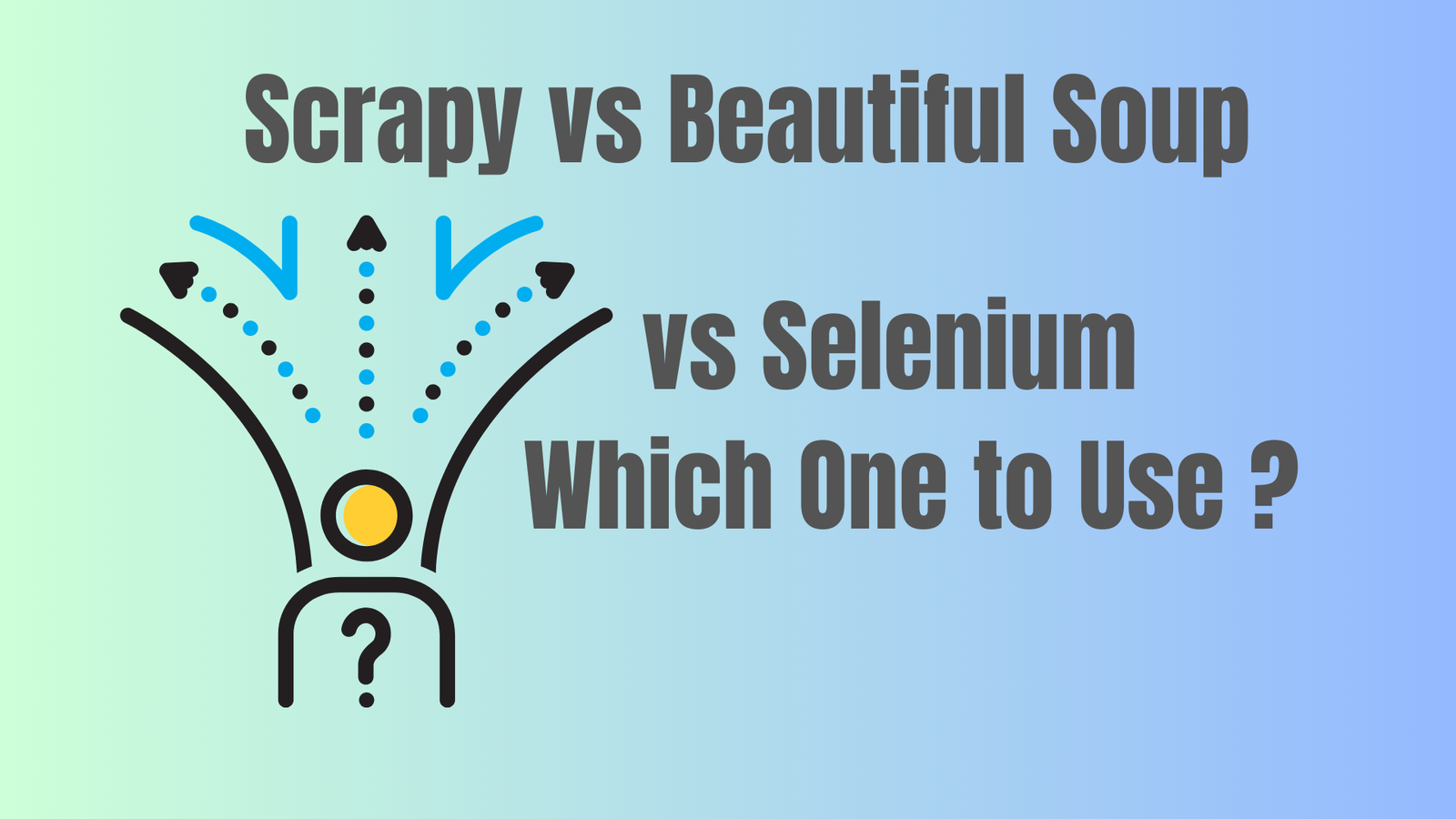We compare three popular web scraping tools to help you decide which one suits your needs.
Scrapy, Beautiful Soup, and Selenium are three widely-used tools for web scraping. If you’re new to scraping or haven’t explored all of them yet, choosing the right tool can be challenging. This guide provides an overview of their capabilities and highlights the scenarios where each tool excels. If you’re short on time, jump straight to the comparison table below.
Scrapy – A Comprehensive Framework for Large-Scale Scraping
Scrapy is a web crawling and scraping framework designed for large-scale projects. Unlike other tools, it doesn’t require additional dependencies to function (unless dealing with JavaScript). It includes everything you need to crawl pages, download and parse data, and store the extracted information.
Key Features
- Python-Based & Open Source: Scrapy is built on Python, making it accessible and supported by a large community.
- Extensible: Supports middleware and extensions for custom functionality.
- Asynchronous Processing: Handles multiple requests simultaneously, making it fast and efficient.
- Built-In Tools: Includes features like proxy integration, cookie handling, and an interactive console for testing CSS or XPath selectors.
Limitations
- Steep Learning Curve: Despite comprehensive documentation, mastering Scrapy requires time and effort.
- No Native JavaScript Rendering: Requires external tools like Puppeteer, Splash, or Selenium for JavaScript-heavy sites.
Best For
Large-scale scraping projects or scenarios where scalability and speed are critical.
Beautiful Soup – A Simple Parser for Beginners and Small Jobs
Beautiful Soup is a Python-based parsing library designed to extract data from poorly structured HTML or XML pages. Unlike Scrapy, it doesn’t handle web crawling or HTTP requests, so you’ll need libraries like Requests to fetch web pages.
Key Features
- Ease of Use: Simple and beginner-friendly, allowing you to write scrapers quickly with minimal code.
- Multiple Parsers: Supports html.parser, HTML5lib, and lxml for flexibility.
- Community Support: Extensive documentation and an active developer community.
Limitations
- No Crawling or Data Storage: Requires additional tools for crawling and storing data.
- Limited Speed: Even with parallelized requests, it can’t match Scrapy’s performance.
Best For
Small-scale or one-time scraping tasks where simplicity and ease of use are priorities.
Selenium – A Web Driver for JavaScript-Dependent Pages
Selenium is an API for controlling headless browsers, primarily used for automated web testing. However, it has also become a popular tool for scraping JavaScript-heavy websites.
Key Features
- JavaScript Rendering: Loads and interacts with JavaScript elements, making it ideal for dynamic websites.
- Cross-Browser Support: Works with major browsers like Chrome, Firefox, and Edge.
- Interactivity: Can emulate user actions like clicking buttons, filling forms, and scrolling.
Limitations
- Resource-Intensive: Requires significant computing power due to its browser-based approach.
- Slow Performance: Not suitable for large-scale scraping due to inefficiency in multithreading.
Best For
Small to moderate scraping projects involving JavaScript-heavy websites.
Comparison Table
| Feature | Scrapy | Beautiful Soup | Selenium |
|---|---|---|---|
| Web Crawling | Yes | No | Yes |
| Data Parsing | Yes | Yes | Yes |
| Data Storage | Yes | No | Yes |
| Asynchronous | Yes | No | No |
| JavaScript Rendering | With external libraries | No | Yes |
| Selectors | CSS, XPath | CSS | CSS, XPath |
| Proxies | Yes | With external libraries | Yes |
| Performance | Fast | Average | Slow |
| Extensibility | High | Limited | Limited |
| Learning Curve | Steep | Easy | Steep |
| Best For | Large-scale scraping | Small to medium projects | JavaScript-heavy websites |
Conclusion
Choosing the right tool depends on your project requirements:
- Scrapy: Ideal for large-scale, continuous scraping projects requiring speed and scalability.
- Beautiful Soup: Perfect for small, one-time tasks where simplicity and ease of use are key.
- Selenium: Best for scraping JavaScript-heavy websites or automating interactions with web pages.
Each tool has its strengths and limitations, so evaluate your needs carefully before making a decision.
This guide provides a clear comparison of Scrapy, Beautiful Soup, and Selenium, helping you choose the best tool for your web scraping projects.

